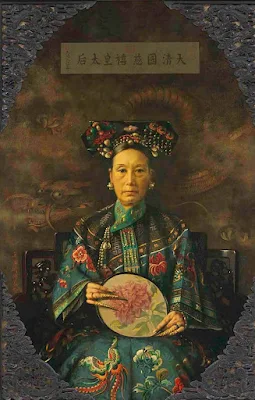OTD 29 November 1835 Empress Dowager Cixi of China
On 29 November 1835 a girl of the Manchu Yehenara clan was born in China.
She was called Cixi.
Selected as an imperial concubine of the Xianfeng Emperor in her adolescence,
she gave birth to a royal son called Zaichun. This took place in 1865.
After the death of the Xianfeng Emperor in 1861, the young boy became the
Tongzhi Emperor and Cixi became Empress Dowager. Later Cixi, among others
was chosen to become regent of China.
Cixi supported technological and military reforms and the Self-Strengthening
Moment. China's defeat in the Second Opium War (1856-1860) was a wake-up
call. Cixi decided that for the first time in the Chinese history, China
would learn from Western powers and import their knowledge and technology.
They purchased 7 British warships.
Cixi consolidated control over the dynasty and she installed her nephew as
the Guangxu Emperor at the death of the Tongzhi Emperor in 1875. Therefore
she broke with the traditional rules of succession of the Qing dynasty that had
ruled China since 1644.
After the Hundred Day's reforms of 1898, she placed the Guangxu Emperor, who
had tried to assassinate her, under virtual house arrest for supporting radical
reformers.
She began to implement fiscal and institutional reforms, which turned China into
a constitutional monarchy.
In 1894, the First Sino-Japanese War broke out. Japan used this war to annex
Taiwan from Qing China.
Cixi and the Guangxu Emperor both died in 1908. They left the court in
the hands of one boy, conservatives and a rebellious public.
In 1912, China became a republic.
Legacy
There are many stories written about Empress Dowager Cixi of China.
* Imperial Woman from Pearl S. Buck
* Empress Orchid by Anchee Min (2004)
* The Last Empress by Anchee Min (2007)
* The Ginger Tree by Oswald Wynd (1977)
and many more
Movies:
* 55 Days at Peking from 1963
* The Empress Dowager from 1970
* Burning of Imperial Palace from 1980
Source pictures: Wikipedia
She was called Cixi.
Selected as an imperial concubine of the Xianfeng Emperor in her adolescence,
she gave birth to a royal son called Zaichun. This took place in 1865.
After the death of the Xianfeng Emperor in 1861, the young boy became the
Tongzhi Emperor and Cixi became Empress Dowager. Later Cixi, among others
was chosen to become regent of China.
Cixi supported technological and military reforms and the Self-Strengthening
Moment. China's defeat in the Second Opium War (1856-1860) was a wake-up
call. Cixi decided that for the first time in the Chinese history, China
would learn from Western powers and import their knowledge and technology.
They purchased 7 British warships.
Cixi consolidated control over the dynasty and she installed her nephew as
the Guangxu Emperor at the death of the Tongzhi Emperor in 1875. Therefore
she broke with the traditional rules of succession of the Qing dynasty that had
ruled China since 1644.
After the Hundred Day's reforms of 1898, she placed the Guangxu Emperor, who
had tried to assassinate her, under virtual house arrest for supporting radical
reformers.
She began to implement fiscal and institutional reforms, which turned China into
a constitutional monarchy.
In 1894, the First Sino-Japanese War broke out. Japan used this war to annex
Taiwan from Qing China.
Cixi and the Guangxu Emperor both died in 1908. They left the court in
the hands of one boy, conservatives and a rebellious public.
In 1912, China became a republic.
Legacy
There are many stories written about Empress Dowager Cixi of China.
* Imperial Woman from Pearl S. Buck
* Empress Orchid by Anchee Min (2004)
* The Last Empress by Anchee Min (2007)
* The Ginger Tree by Oswald Wynd (1977)
and many more
Movies:
* 55 Days at Peking from 1963
* The Empress Dowager from 1970
* Burning of Imperial Palace from 1980
Source pictures: Wikipedia






Comments